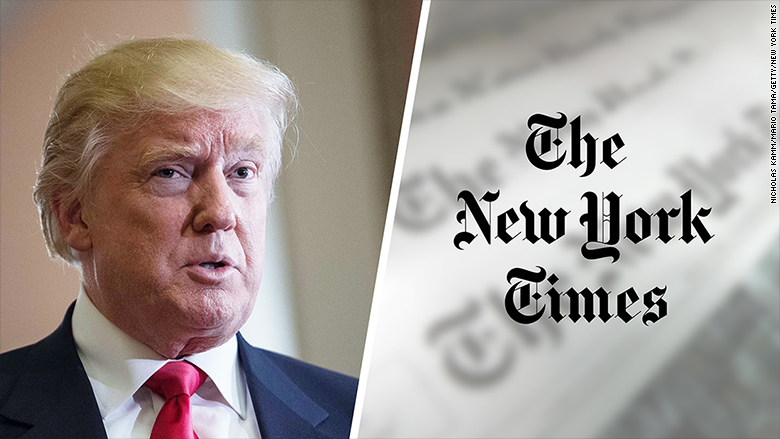
There's no relationship in the world quite like President Trump's relationship with The New York Times.
Trump reads The Times, craves its approval, and condemns its coverage of his presidency. He regularly labels the paper as "failing" and misleads his supporters about its journalistic standards, but gives interviews to its reporters and business advice to its owner.
The latest example: On Tuesday morning, Trump tweeted some self-serving advice to the newspaper while misstating some facts about it.
Think about the past couple of weeks: The Times has published a series of in-depth stories illuminating Trump's tumultuous first year in office. One of those stories cited anonymous sources who said Trump used degrading language to describe immigrants.
According to the Times, Trump said in a private meeting that Haitian immigrants "all have AIDS" and that Nigerian immigrants would never "go back to their huts" in Africa. The comments, allegedly made over the summer, was denounced as racist. White House aides denied that Trump ever said it.
The story came and went -- and what did Trump do a few days later? He gave an interview to Times reporter Michael Schmidt. Some aides didn't even know about the interview until it was published.
Trump rarely grants interviews to media outlets other than Fox News, so this was a big coup for Schmidt, who snagged the interview by talking with Trump at a Florida golf resort.
As a native New Yorker, Trump has been reading the paper for decades. When I worked at the Times in the late 2000s, Trump sometimes sent me and my colleagues copies of our stories from the print edition with a compliment or a complaint scrawled in black sharpie pen.
During his presidential campaign, Trump routinely called the Times "failing," often seemingly in response to stories he did not like. His campaign even threatened to sue The Times, but did not follow through.
After Election Day, he visited the newspaper's midtown Manhattan headquarters for an interview with reporters and opinion writers, and he praised The Times as a "great, great American jewel."
Yet he has insulted the Times via Twitter more than 150 times, according to the newspaper's own count. Among the many slurs: "Weak," "fake news," "sick," "so wrong," "nasty," and "not nice."
Those attacks have been credited with helping The Times gain more readers and subscribers.
But when he's not calling the paper "failing," he's talking to its reporters. He has granted multiple interviews to Times reporters like Schmidt and Maggie Haberman this year.
Haberman, who is also a CNN political analyst, has been called Trump's "favorite foe" and likened to his therapist.
She said in a podcast interview last year that Trump "craves the paper's approval."
In fact, some Trump allies, like his former chief strategist Steve Bannon, have bemoaned Trump's Times fixation.
"Trump's tendency is to always get Maggie Haberman in there. He reads The New York Times. To him that's the paper of record," Bannon recently told Vanity Fair.
So on Tuesday, Trump marked a historic moment for The Times -- the handoff from father Arthur Sulzberger to son A.G. -- with two tweets that were congratulatory and critical at the same time.
"The Failing New York Times has a new publisher, A.G. Sulzberger. Congratulations! Here is a last chance for the Times to fulfill the vision of its Founder, Adolph Ochs," he wrote.
Then he quoted a famous Ochs saying about the paper's mission: "To give the news impartially, without fear or favor, regardless of party, sect, or interests involved."
(A.G. quoted this in a letter to readers that was published in Tuesday's print edition, which suggests that Trump had just read the letter.)
Times devotees noticed an error in Trump's tweet: Ochs was not actually the founder of The Times.
The founders of the paper, named the New-York Daily Times in 1851, were Henry Jarvis Raymond and George Jones. Ochs then purchased the paper in 1896.
Trump made another mistake in his second tweet on Tuesday morning.
He urged the paper to hire "impartial journalists of a much higher standard, lose all of your phony and non-existent 'sources,' and treat the President of the United States FAIRLY, so that the next time I (and the people) win, you won't have to write an apology to your readers for a job poorly done!"
He is fond of claiming that the Times apologized for its 2016 campaign coverage, but that's not true.
The Times responded to Tuesday's tweets by inviting people to read Sulzberger's full letter to readers.
The letter didn't mention Trump by name, but it referenced politicians who "jockey for advantage by inflaming suspicion of the press" as one of the challenges facing the news media.


